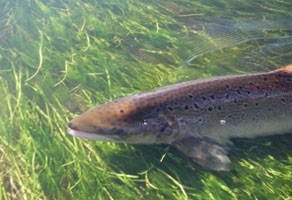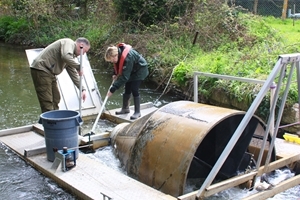 UK-wide conservation organisation the Game & Wildlife Conservation Trust (GWCT) has today highlighted its serious concerns over the impact of the 200-barrel fluid leak into Poole Harbour on protected migratory fish. The GWCT operates the Salmon & Trout Research Centre on the River Frome at East Stoke, Dorset, which has been monitoring the salmon population in depth for 50 years.
UK-wide conservation organisation the Game & Wildlife Conservation Trust (GWCT) has today highlighted its serious concerns over the impact of the 200-barrel fluid leak into Poole Harbour on protected migratory fish. The GWCT operates the Salmon & Trout Research Centre on the River Frome at East Stoke, Dorset, which has been monitoring the salmon population in depth for 50 years.
A major incident was declared on Sunday 26 March 2023, when a leak occurred at a pipeline operated by gas company Perenco.
The leak coincides with the start of the sea-bound migration of vulnerable young Atlantic salmon (Salmo salar) and sea trout (Salmo trutta), known as smolts, from the Rivers Frome and Piddle, which flow directly into Poole Harbour. The young salmon and trout hatch from eggs laid by adults in the river, where they spend 1-3 years before migrating to sea from March to mid-May. Here they will feed and grow for a further 1-3 years before returning to the river of their birth to reproduce.
Every spring, GWCT scientists trap smolts to quantify how many are leaving the river and to scan them for a PIT-tag (a microchip, which enables them to identify individuals) and record biometric information, before releasing them.
 “This is the worst possible time for migratory salmonids. We are currently catching them in numbers through our smolt trap, so we know that they are passing through Poole Harbour at the moment,” said GWCT Head of Fisheries Research, Dr Rasmus Lauridsen.
“This is the worst possible time for migratory salmonids. We are currently catching them in numbers through our smolt trap, so we know that they are passing through Poole Harbour at the moment,” said GWCT Head of Fisheries Research, Dr Rasmus Lauridsen.
Dylan Roberts, Head of Fisheries at the GWCT, which is a member of the Missing Salmon Alliance, said: “During their migration through estuaries, they are at a crucial and highly sensitive stage of their life cycle as their bodies adjust to transferring from living in rivers to sea water. We are extremely concerned that these increasingly rare young fish may perish in the polluted waters.”
When exposed to oil, adult fish may experience reduced growth, enlarged livers, changes in heart and respiration rates, fin erosion, and reproduction impairment. Fish eggs and larvae can be especially sensitive to lethal and sublethal impacts. Even when lethal impacts are not observed, oil can make fish and shellfish unsafe for humans to eat.
The River Frome is recognised for its environmental importance. It is a designated Site of Special Scientific Interest (SSSI) for its ecology and geomorphology including salmon and sea trout, and a Special Protection Area (SPA) for Birds. Poole Harbour designated as a Site of Special Scientific Interest, a Special Protected Area and a Ramsar site.
Some areas of the British Isles have seen over a 70% decline in wild Atlantic salmon in the past 25 years. Most wild salmon populations in England’s rivers are below sustainable levels and classified as ‘At Risk’ by the Environment Agency, which is tasked with their protection.
Atlantic salmon are listed as vulnerable on the European IUCN Red List of Threatened Species. It is also a species of international concern and is listed under the Bern convention, and listed to be protected under the Water Framework Directive. The Rivers Frome and Piddle, which flow into Poole Harbour, are home to other migratory species that migrate from rivers to the marine environment for part of their life cycle. These include the European eel (Anguilla anguilla), which is listed as critically endangered on the IUCN Red List, and the sea lamprey (Petromyzon marinus), which are migrating through Poole Harbour at this time of year.
The River Frome is one of 12 Index Rivers for Atlantic salmon around the North Atlantic, which are used to report the condition of wild salmon populations by the International Council for the Exploration of the Seas (ICES), and are used to set international exploitation rates for salmon fisheries across the Atlantic.
Notes to editors
The Game & Wildlife Conservation Trust – providing research-led conservation for a thriving countryside. The GWCT is an independent wildlife conservation charity which has carried out scientific research into Britain’s game and wildlife since the 1930s. We advise farmers and landowners on improving wildlife habitats. We employ more than 60 post-doctoral scientists and other research staff with expertise in areas such as birds, insects, mammals, farming, fish and statistics. We undertake our own research as well as projects funded by contract and grant-aid from government and private bodies.
For information, contact:
Eleanor Williams
Telephone: 07592 025476
Email: press@gwct.org.uk